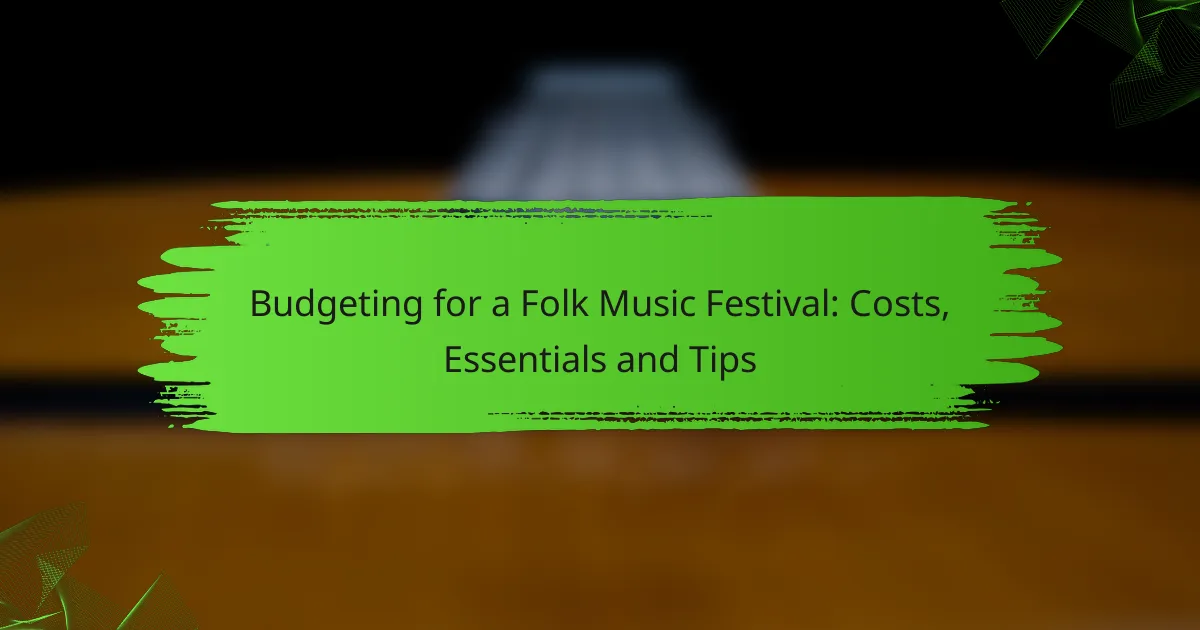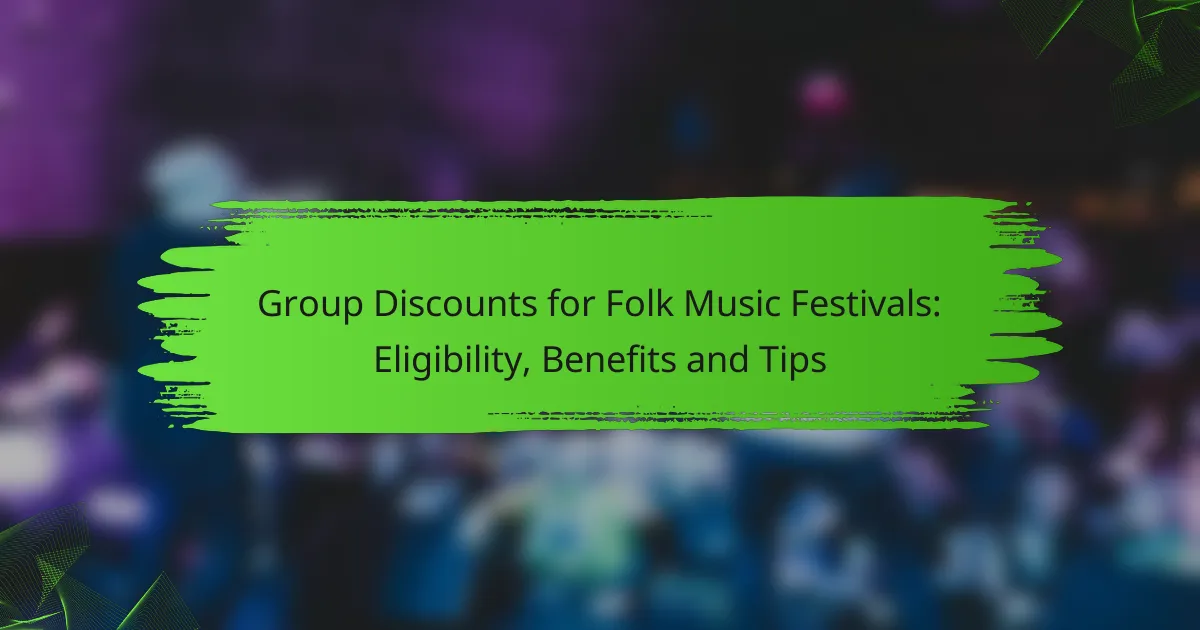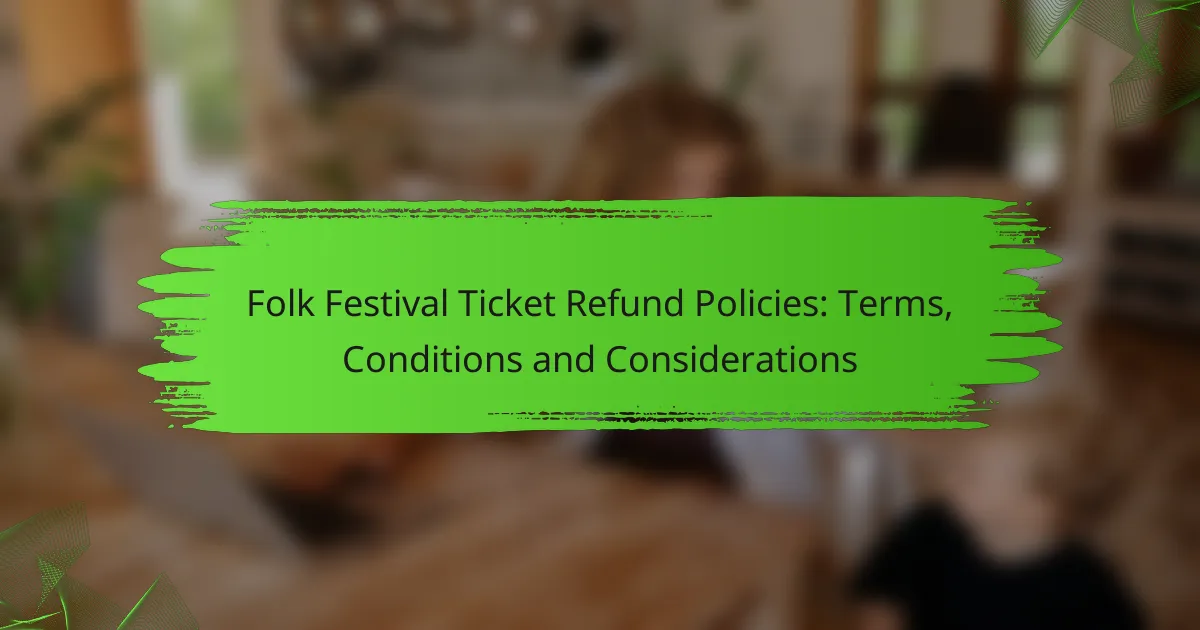Budgeting for a folk music festival is essential for ensuring a memorable experience without financial strain. Key expenses to consider include ticket prices, accommodation, food, transportation, and merchandise. By estimating these costs and planning accordingly, you can enjoy the festival while staying within your budget.
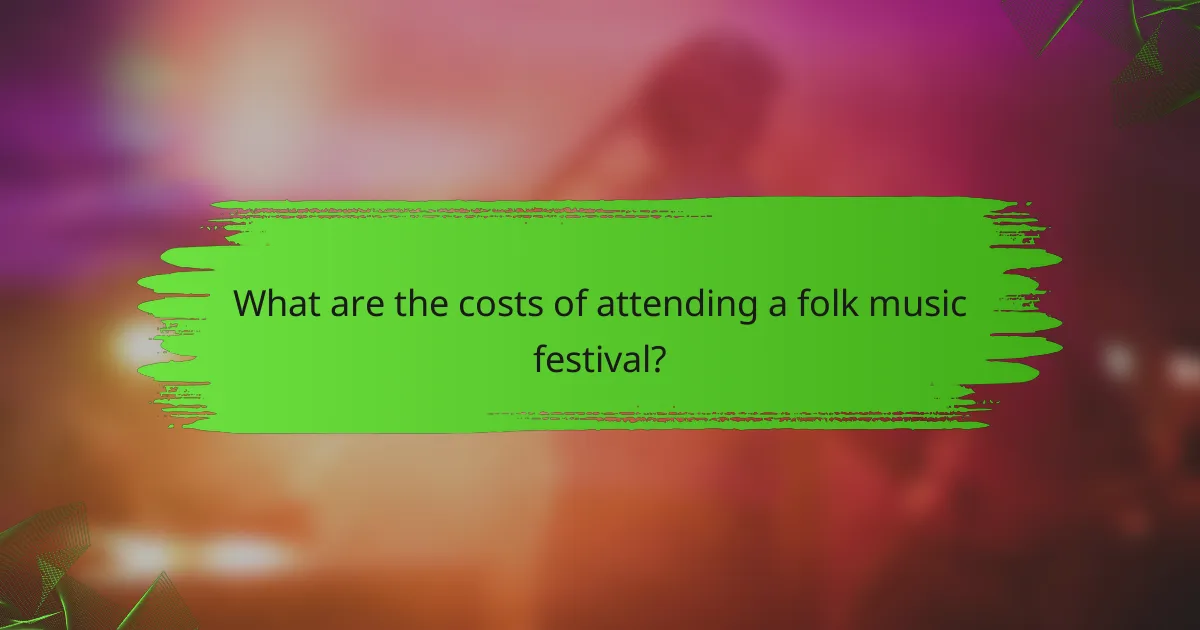
What are the costs of attending a folk music festival?
Attending a folk music festival involves various costs that can add up quickly. Key expenses include ticket prices, accommodation, food and beverages, transportation, and merchandise. Understanding these costs can help you budget effectively for an enjoyable experience.
Ticket prices for major festivals
Ticket prices for folk music festivals can vary significantly based on the event’s popularity and location. Generally, you can expect to pay anywhere from $50 to $300 for a general admission ticket. Some festivals offer early bird discounts or package deals that include multiple days or VIP access, which can provide better value.
Be sure to check the festival’s official website for pricing details and any additional fees, such as service charges or parking. Purchasing tickets in advance is often cheaper than buying at the gate.
Accommodation expenses
Accommodation costs can range widely depending on your preferences and proximity to the festival venue. Options may include camping, budget hotels, or upscale lodgings, with prices typically ranging from $20 for camping to over $200 per night for hotels. Booking early can secure better rates and availability.
Consider staying slightly farther from the festival site to find more affordable options, but factor in transportation costs to get to and from the venue.
Food and beverage costs
Food and beverage expenses at folk music festivals can add up quickly, with prices often higher than average. Expect to spend around $10 to $20 per meal, depending on the variety of food vendors available. Many festivals allow you to bring your own food and drinks, which can help reduce costs.
Check the festival’s rules regarding outside food and beverages, as some events may have restrictions. Planning meals ahead of time can also help you stay within budget.
Transportation fees
Transportation costs to and from a folk music festival can vary based on your location and mode of travel. If you’re driving, consider gas prices, tolls, and parking fees, which can range from $10 to $50. Public transportation options may be available, often providing a more economical choice.
For those traveling from out of town, factor in airfare or train tickets, which can fluctuate greatly depending on the season and how far in advance you book.
Merchandise and extras
Merchandise at folk music festivals, such as t-shirts, posters, and albums, can be tempting but can also add to your overall costs. Prices for festival merchandise typically range from $10 to $50. Set a budget for souvenirs to avoid overspending.
Additionally, consider any extra activities or workshops offered at the festival, which may have additional fees. Prioritize what you really want to experience to keep your spending in check.

How to budget for a folk music festival?
Budgeting for a folk music festival involves estimating costs for tickets, travel, accommodations, food, and other essentials. A well-planned budget helps ensure you enjoy the festival without overspending or financial stress.
Creating a detailed budget plan
Start by listing all potential expenses associated with the festival. Common categories include ticket prices, transportation costs, lodging, meals, and merchandise. For example, tickets might range from $50 to $200, while accommodations can vary significantly based on location and type.
Break down each category into specific items. For instance, under meals, consider daily food budgets, which could be around $30 to $60 per day, depending on your dining choices. This level of detail helps you see where your money will go and allows for adjustments as needed.
Setting priorities for spending
Identify which aspects of the festival are most important to you. If seeing your favorite artists is a priority, allocate more of your budget to tickets. Conversely, if you’re flexible about accommodations, you might choose to camp or stay in budget-friendly hostels.
Consider creating a hierarchy of needs versus wants. Essentials like transportation and tickets should take precedence, while extras like souvenirs or premium food options can be adjusted based on your remaining budget. This approach helps you make informed decisions during the festival.
Using budgeting apps for tracking
Utilize budgeting apps to keep track of your expenses in real-time. Apps like Mint or YNAB (You Need A Budget) allow you to categorize spending and set limits for each category. This can help prevent overspending and keep your finances in check throughout the festival.
Many of these apps also offer features for tracking receipts and upcoming bills, which can be particularly useful during a busy festival weekend. Set up your budget in the app before the festival starts, and update it daily to ensure you stay on track.
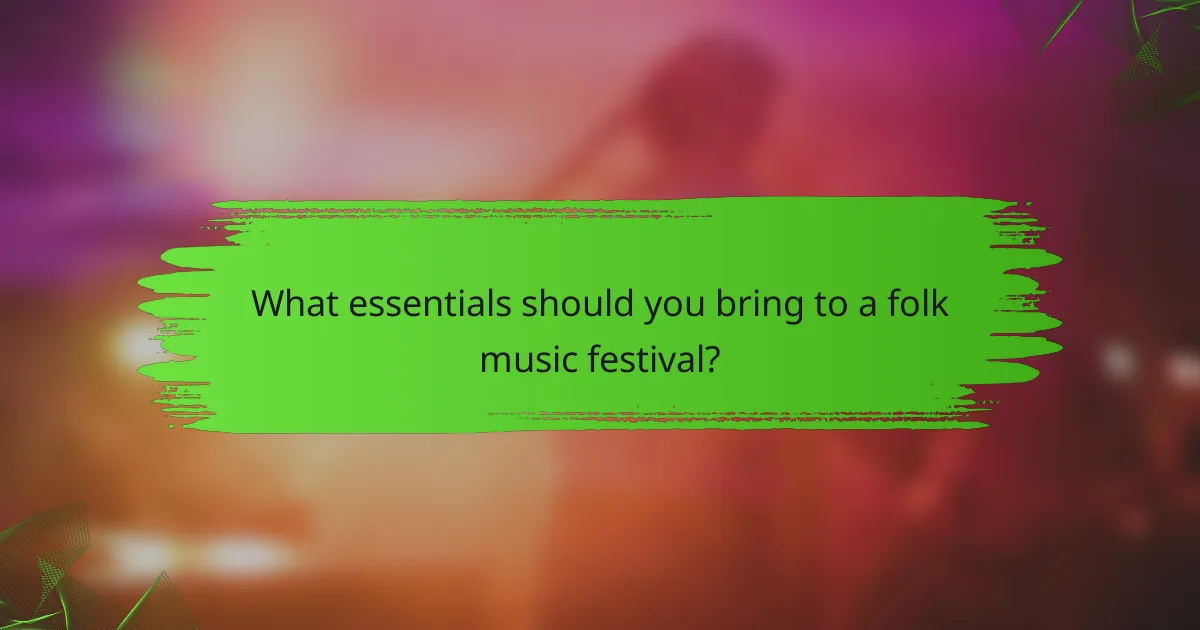
What essentials should you bring to a folk music festival?
Bringing the right essentials to a folk music festival ensures a comfortable and enjoyable experience. Key items include camping gear, appropriate clothing, and food and drink provisions to keep you energized throughout the event.
Camping gear and supplies
When attending a folk music festival, having the right camping gear is crucial. A durable tent, sleeping bag, and sleeping pad will provide comfort during your stay. Consider a portable chair for relaxing between performances and a small table for meals or games.
Don’t forget essential supplies like a flashlight, multi-tool, and a first-aid kit. It’s wise to pack extra batteries and a portable phone charger to stay connected and safe.
Clothing for varying weather
Folk music festivals often span several days and can experience unpredictable weather. Pack layers, including a light jacket, t-shirts, and long pants, to adapt to changing temperatures. Waterproof clothing is essential if rain is in the forecast.
Comfortable footwear is a must, as you’ll likely be on your feet for long periods. Consider bringing a hat and sunglasses for sunny days, along with a warm hat and gloves for cooler evenings.
Food and drink provisions
Having your own food and drink can enhance your festival experience and save money. Non-perishable snacks like granola bars, nuts, and dried fruit are great for quick energy boosts. If you have access to a cooler, pack sandwiches, fruits, and drinks to stay refreshed.
Check festival rules regarding outside food and beverages, as some events may have restrictions. Bring a reusable water bottle to stay hydrated, as many festivals provide water refill stations.
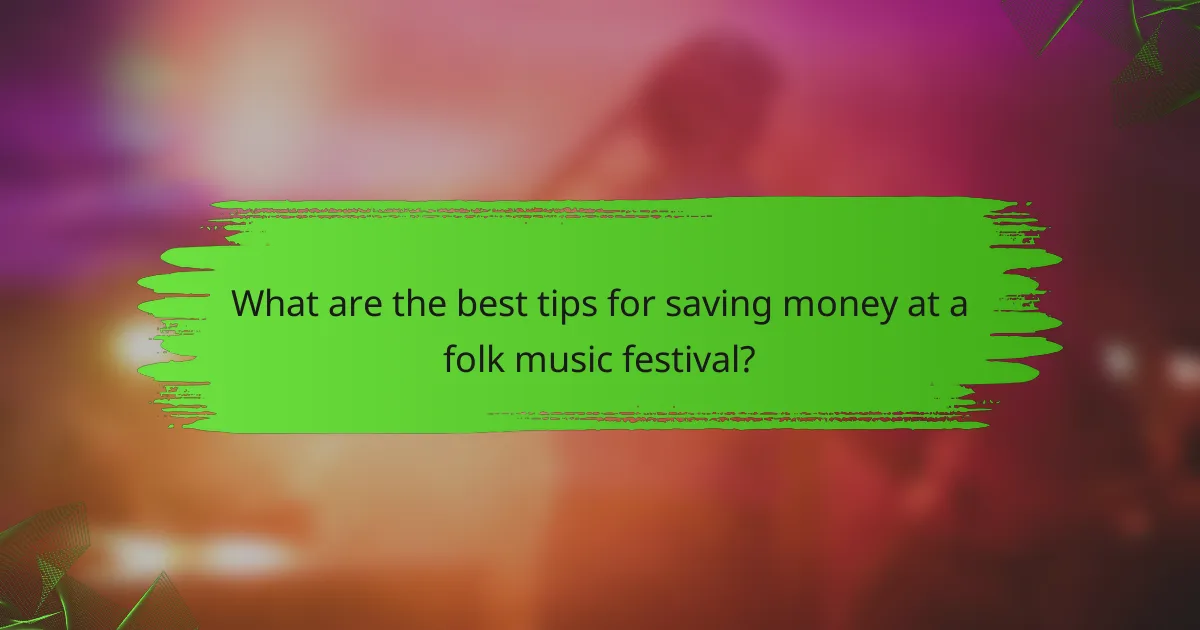
What are the best tips for saving money at a folk music festival?
To save money at a folk music festival, consider planning ahead and taking advantage of discounts and free offerings. Early ticket purchases, group deals, and participating in complimentary activities can significantly reduce your overall expenses.
Early bird ticket purchases
Buying early bird tickets is one of the most effective ways to save money on festival entry fees. These tickets are typically offered at a reduced price for a limited time before the event. Prices can vary, but early bird tickets often save festival-goers anywhere from 10% to 30% compared to standard ticket prices.
Be sure to check the festival’s official website or authorized ticket vendors for announcements regarding early bird sales. Setting reminders for ticket release dates can help ensure you don’t miss out on these savings.
Group discounts and packages
Many folk music festivals offer group discounts for attendees purchasing tickets together. This can be a great way to enjoy the festival with friends while saving money. Discounts may range from 10% to 20% depending on the size of the group.
In addition to ticket discounts, some festivals provide package deals that include accommodations or meal plans. These packages can offer significant savings compared to purchasing each item separately, making them worth considering if you’re attending with a larger group.
Free activities and workshops
Folk music festivals often feature a variety of free activities and workshops that can enhance your experience without adding to your budget. Look for opportunities such as open mic sessions, jam circles, and instrument workshops that allow you to engage with the music community.
Check the festival schedule ahead of time to identify these free offerings. Participating in these activities not only saves money but also enriches your festival experience by allowing you to learn new skills and meet fellow music enthusiasts.
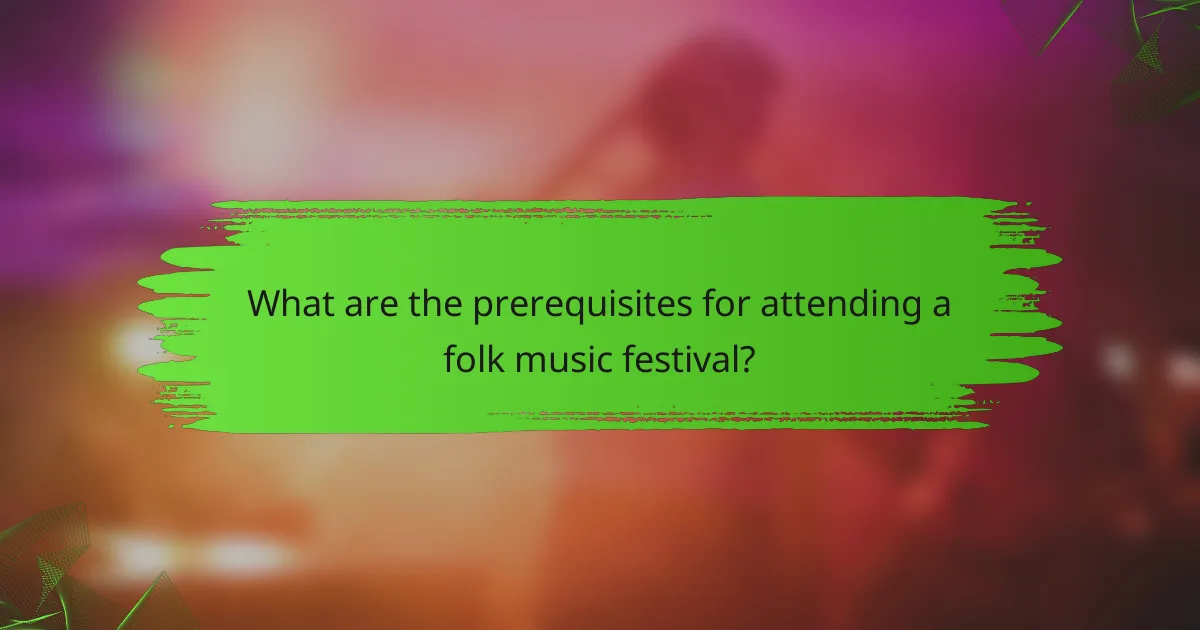
What are the prerequisites for attending a folk music festival?
To attend a folk music festival, you typically need to secure tickets, arrange transportation, and plan accommodations. Understanding the festival’s specific requirements and guidelines can enhance your experience and ensure a smooth visit.
Researching festival locations
When researching festival locations, consider factors such as accessibility, nearby amenities, and the overall atmosphere of the area. Popular folk music festivals often take place in scenic outdoor venues, which may require travel arrangements and accommodations.
Look for information on local lodging options, including hotels, campgrounds, or rental properties. Prices can vary significantly, so compare options to find what fits your budget, typically ranging from low tens of USD per night for camping to higher rates for hotels.
Understanding festival rules and regulations
Each folk music festival has its own set of rules and regulations that attendees must follow. Common guidelines include restrictions on outside food and beverages, prohibited items like large umbrellas or professional cameras, and rules regarding camping or parking.
Familiarize yourself with the festival’s official website or contact organizers for detailed information. This will help you avoid common pitfalls, such as being turned away at the entrance due to non-compliance with festival policies. Always check for updates as rules can change from year to year.
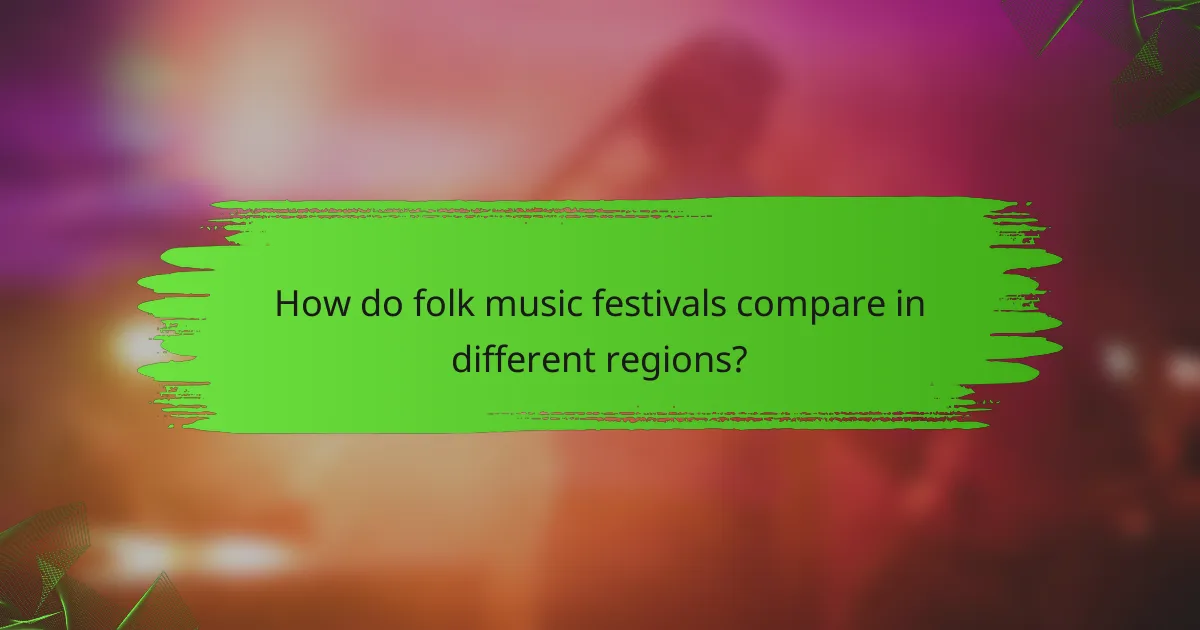
How do folk music festivals compare in different regions?
Folk music festivals vary significantly across regions in terms of scale, cultural significance, and costs. In the United States, festivals often feature a mix of traditional and contemporary folk music, while European festivals may emphasize regional styles and heritage.
Popular festivals in the United States
Some of the most renowned folk music festivals in the United States include the Newport Folk Festival in Rhode Island and the Kerrville Folk Festival in Texas. These events typically attract thousands of attendees and feature a diverse lineup of artists, ranging from established acts to emerging talent.
Costs for attending these festivals can vary widely, with ticket prices generally ranging from $50 to several hundred dollars, depending on the festival’s length and lineup. Additionally, consider accommodation and travel expenses, as many festivals are held in remote locations.
Notable festivals in Europe
In Europe, notable folk music festivals include the Cambridge Folk Festival in the UK and the Festival Interceltique de Lorient in France. These festivals showcase a rich tapestry of folk traditions, often highlighting local artists alongside international performers.
Entry fees for European festivals can range from €30 to €150, with many offering camping options to keep costs down. It’s essential to book accommodations early, as these festivals can draw large crowds and nearby lodging may fill quickly.
